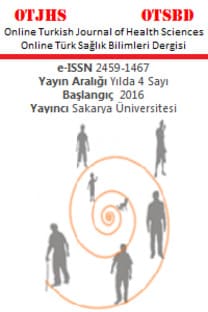Kısa Süreli Kan Bağışı Retlerinde Telefon ve Mesajla Yapılan Hatırlatmanın Bağışçı Kazanı-mına Etkisi: Randomize Kontrollü Deneysel Çalışma
The Effect of Telephone and Message Reminder on Donor Gain in Temporary Blood Deferrals: Randomised Controlled Trial
___
- 1. Porto-ferreira FA, Almeida-neto C De, Murphy EL, et al. A randomized trial to evaluate the use of text messaging, letter and telephone call reminders to improve return of blood donors with reactive serologic tests. HHS Public Access. 2018;57(1):102-107.
- 2. World Health Organization. Global Status Report on Blood Safety 2016. https://apps.who.int/iris/ bitstream/handle/10665/254987/9789241565431- eng.pdf?sequence=1&isAllowed=y. Accessed Novamber 8, 2018.
- 3. Kan Hizmetleri Genel Müdürlüğü. Kan Hizmetleri Genel Müdürlüğü Faaliyet Kitabı 2016. https://www.kanver.org/Upload/Dokuman Dosya/93488678_ khgm_2016.pdf. Erişim Eylül 11, 2018.
- 4. Khurram S, Borhany M, Anwar N, et al. Frequency and reasons of donor deferral prior to blood donation process: A single centre experience. Transfus Med. 2016;27:10-15.
- 5. Gonzo M, Shuuveni A, Mukesi M, Chipare I, Moyo S. Assessment of donor deferral rates and deferral reasons at the Namibia blood transfusion services. Int J Blood Transfus Immunohematol. 2016;5:37-43.
- 6. Kasraian L, Negarestani N. Rates and reasons for blood donor deferral, Shiraz, Iran: A retrospective study. Sao Paulo Med J. 2015;133(1):36-42.
- 7. Khan S, Rehman N, Raziq F. Donor deferral: Evaluation of causes on pre donor screening. Gomal J Med Sci. 2012;10(1):23-26.
- 8. Zou S, Musavi F, Edward P, Rios JA, Trouerntrend J. Donor deferral and resulting donor loss at the American Red Cross Blood Services, 2001 through 2006. Transfusion. 2008;48:2531-2539.
- 9. Germain M, Godin G. The relative efficacy of telephone and email reminders to elicit blood donation. Vox Sang. 2016;110:278-281.
- 10. Custer B, Schlumpf K, Wright D, Simon TL, Wilkinson S, Ness PM. Donor return following temporary deferral. NIH Public Access. 2011;51 (6):1188-1196.
- 11. Halperin D, Newman B. The effect of short-term, temporary deferral on future blood donation. Transfusion. 1998;38(2):181-183.
- 12. Al Shaer L, Sharma R, Abdulrahman M. Analysis of blood donor pre-donation deferral in Dubai: Characteristics and reasons. Dovepress. 2017;8:55-60.
- 13. Müller-Steinhardt M, Weidmann C, Wiesneth M, et al. Donor deferral rates after the implementation of a new German Blood Donor Questionnaire. Transfus Med Hemother. 2012;39:17-22.
- 14. Gülen H, Tüzün F, Ayhan Y, Erbay A, Öztürk E, Vergin C. The evaluation of blood donor deferral causes. Pediatr Hematol Oncol. 2009;23:91-94. 15. Arslan Ö. Whole blood donor deferral rate and characteristics of the Turkish population. Transfus Med. 2007;17:379-383.
- 16. Ngoma A, Goto A, Sawamura Y, Nollet KE, Ohto H, Yasumura S. Transfusion and apheresis science analysis of blood donor deferral in Japan: Characteristics and reasons. Transfus Apher Sci. 2013;49(3):655-660.
- 17. Smith G, Fisher S, Doree C, Di Angelantonio E, Roberts DJ. Oral or parenteral iron supplementation to reduce deferral, iron deficiency and/or anaemia in blood donors. Cochrane Database Syst Rev. 2014;3(7):1-20.
- 18. Thijsen A, Masser B. Vasovagal reactions in blood donors: Risks, prevention and management. Transfus Med. 2017;16:25-59.
- 19. Morand C, Coudurier N, Rolland C, et al. Prevention of syncopal-type reactions after whole blood donation: A cluster-randomized trial assessing hydration and muscle tension exercise. Transfusion. 2016;56:2412-2411.
- 20. Sinclair KS, Campbell TS, Carey PM, Langevin E, Bowser B, France CR. An adapted postdonation motivational interview enhances blood donor retention. NIH Public Access. 2011;50 (8):1778-1786.
- 21. Reich P, Roberts P, Laabs N, et al. A randomized trial of blood donor recruitment strategies. Transfusion. 2006;46:1090-1096.
- ISSN: 2459-1467
- Yayın Aralığı: 4
- Başlangıç: 2016
- Yayıncı: Oğuz KARABAY
Radyasyon Çalışanlarının Radyasyon Bilinci Anketi
Ahmet murat ŞENIŞIK, Duygu TUNÇMAN GENÇ, Eda MUTLU
Hilal USLU YUVACI, Mehmet Musa ASLAN, Elif KÖSE, Merve KESKİN PAKER, Arif Serhan CEVRİOĞLU
Cüneyt KURU, Elçin KAL ÇAKMAKLIOĞULLARI
Alışılmadık Bir Akut Skrotum Nedeni
Zeliha AKIŞ YILDIZ, Aytekin KAYMAKÇI, Ebru ZEMHERİ
Pınar YILDIZ, Fatih ÜZER, Ege GÜLEÇ BALBAY
Laboratuvar Verimlilik Komisyonu Değerlendirilmesi
Kalp Tipi Yağ Asid Bağlayıcı Proteinin Akut Koroner Sendrom Risk Skorları ile İlişkisi
Uğur KÜÇÜK, Hakan TÜRKÖN, Burak ALTUN
Pınar Yıldız GÜLHAN, Ege GÜLEÇ BALBAY, Fatih UZER
Annelerin İnfantil Kolik İçin Kullandıkları Uygulamalar ve Yararları Konusundaki Algıları
BİRSEN MUTLU, Zeynep ERKUT, Şerife AVCI, Sıdıka sümeyye GİRGİN, İsmail GÖNEN
